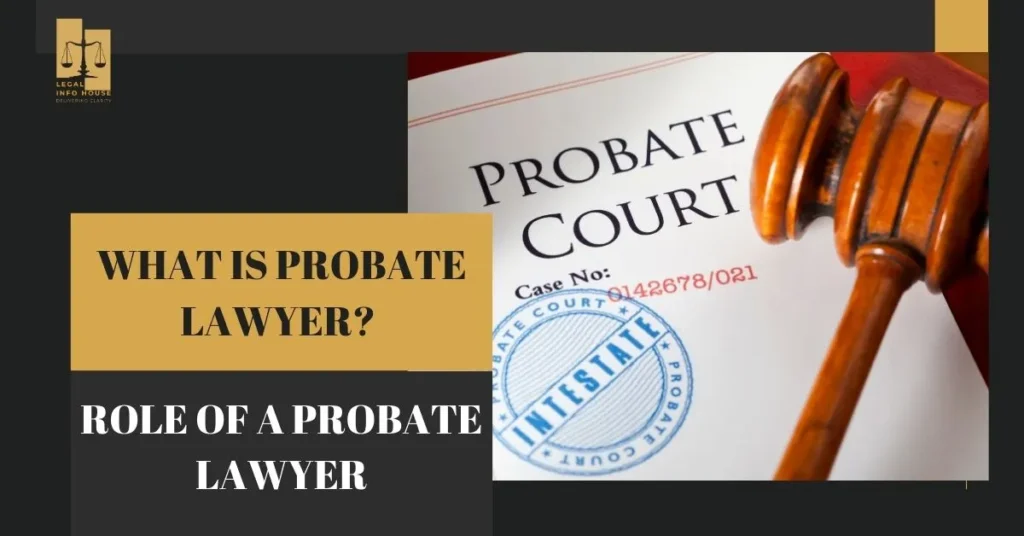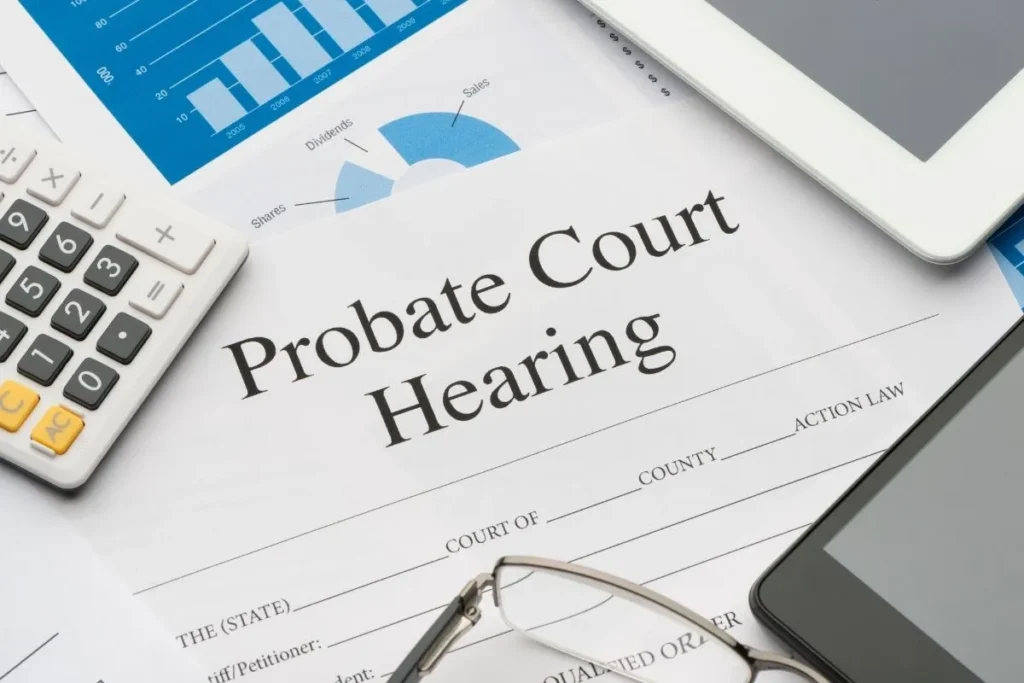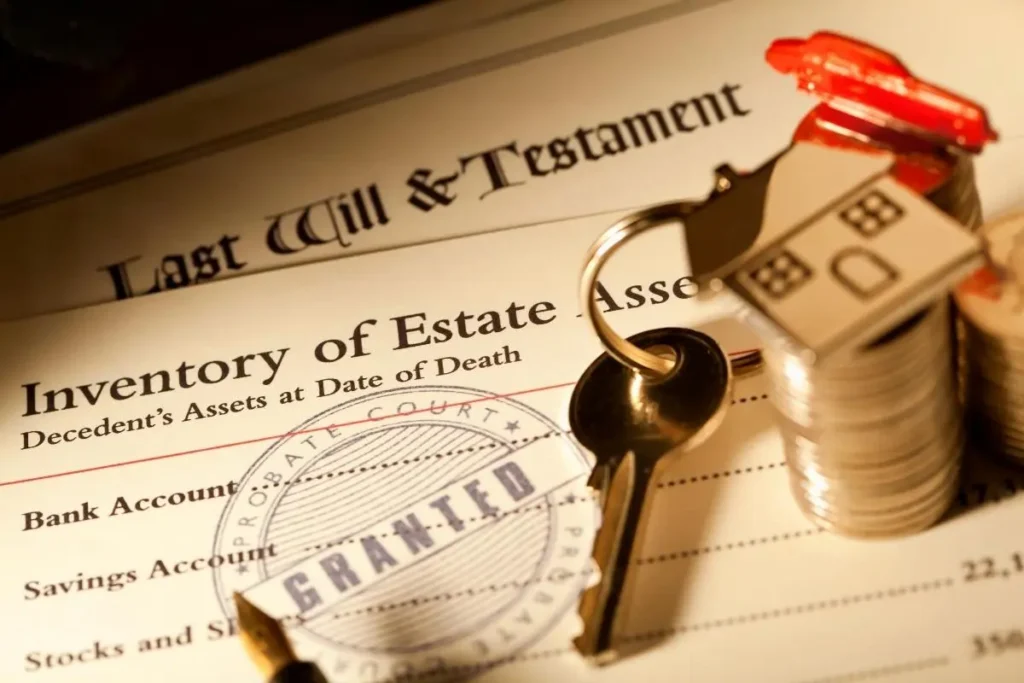
A probate lawyer helps to settle estates after someone dies. They guide us through legal processes. This includes validating the will, distributing assets, paying debts, and handling disputes. They also manage court filings and tax matters, ensuring the estate complies with local laws.
What is Probate?
Probate is the legal process of validating a will, settling debts, and distributing a deceased person’s assets. It is about making sure that the dead person’s will.
If any, is recognized, and their assets shared according to the will or state laws if there is no will. It helps in paying off debts and ensuring assets are distributed fairly to heirs.
Common Scenarios Requiring Probate
Probate often comes into play when a person dies having owned property in their own name only, with no specific beneficiary designated for their assets, or has left behind an disputed will.
These scenarios come with different implications and call for comprehensive legal processes that guarantee justice and compliance with existing rules.
Role of a Probate Lawyer
Overview of Duties
A probate lawyer is a professional specializing in probating law and estate administration. Therefore, he/she undertakes various activities such as submitting the deceased’s testament to court and managing or distributing all properties appertaining thereto.
In essence, they serve as counsellors or supporters of the executor of an estate including all listed beneficiaries.
Significance in the Probate Process
The probate process can become complex due to numerous legal challenges involved. Therefore, a probate lawyer can be very helpful while handling these problems; it assists them fulfil all legal requirements and safeguard interests of this particular estate together with its claimants.
Initial Consultation
- Understanding the Case
The initial consultation between interested parties seeks to gather facts about the case by hearing from one party alone. Such information might mostly include details regarding what properties did he/she have at death?
Who was entitled to inherit his/her possessions?, among other issues influencing such matters. Its main purpose is laying out an appropriate action plan for servicing an entire transaction involving real estate transfer activities within the shortest time possible.
- Providing Legal Advice
At first meeting, the attorney shall provide instructions on how best implementation process should be executed onto beneficiaries or personal representative so as to minimize battles that arise among them.
The attorney also inform the executor about how the entire process works including potential challenges witnessed in probate with regard timelines and costs.

Filing the Will with the Probate Court
- Importance of Filing
Among initial formalities for commencing the probate process is filing a will with the probate court. This will is an introduction to legal procedures needed towards validating and administering this estate.
- Process Overview
This entails taking original will, death certificate and a petition for probate to court. These papers are scrutinized by court, which endorses it as a valid document while at same time installing someone who can manage properties of deceased in order to accomplish desired plan.
Inventory of Estate Assets
- Identifying Assets
Another task set out for this lawyer involves listing all assets belonging to such deceased party. Such items include lands, savings accounts, investments, houses plus any other item valuable in nature.
- Valuing the Estate
When it comes to valuation of these assets, parties involved would rely on solicitors who help them know what they own. Some examples include appraisals required for real property or personal effects.
While assessments may be carried out on bank account balances, to mention just a few. All these determinants represent factors that constitute the total value of an estate under consideration.
Managing and Distributing Assets
- Estate Administration
Estate administration refers to overseeing the management of assets throughout the entire probate process. In so doing, he ensures that proper records are kept regarding each asset’s existence during this period.
Additionally, any income that accrues from such investments is properly accounted for by those responsible.
- Ensuring Proper Distribution
After all liabilities are paid off and taxes cleared, remaining assets must be distributed in accordance with testamentary wishes or intestacy laws by probate lawyers who also make sure every beneficiary gets his/her fair share from an estate according statutory regime defined in terms law of succession.
Handling Debts and Taxes
- Settling Outstanding Debts
One of the most important tasks that a probate attorney has is to determine and pay off any outstanding debts that the deceased may have had. This includes notifying creditors, verifying claims, and settling the debts from money in the estate.
- Managing Estate Taxes
Estate taxes are also dealt with by the attorney which can be intricate. The preparation and filing of necessary tax returns, on-time payments and attempts to minimize tax exposure so that resources are saved for heirs as much as possible.
Mediating Disputes
- Resolving Family Conflicts
The probate process sometimes causes family disputes because of disagreements over who should get what under the will or who gets particular assets from those left behind. A lawyer specialised in probate acts as an arbitrator ensuring peace prevails while dissimilarities are addressed.
- Legal Representation in Court
Where there is no settlement between parties involved; legal counsel is represented by a solicitor in cases such as these. They present facts and make arguments to back up their assertions on behalf of either an executor or beneficiaries of an estate.
Ensuring Legal Compliance
- Adhering to Probate Laws
All steps taken throughout the entire probate process must be carried out according to state laws and regulations. By ensuring such actions are within legal limits, a probate attorney shall guarantee proper estate administration.
- Avoiding Legal Pitfalls
Probate could turn out wrong without seeking expert advice hence following errors. Consequently, it’s critical for one to engage a lawyer specialized in this area to avoid mistakes arising whenever this process starts till its completion.
Guardianship and Conservatorship
- Roles and Responsibilities
In situations where minors were left by the deceased parents or incapacitated adults among his/her dependents, if they survive him/her, he/she would have helped them establish guardianship or conservatorship.
Such persons help guide legally appointed guardians or conservators through their responsibilities.
- Legal Process Involved
This requires making application for conservatorship or guardianship to court, proving why such an appointment is necessary and finally ensuring that guardian/conservator carries out his/her functions in accordance with the law.
Special Circumstances
- Intestate Estates
If a person dies without leaving a will, known as intestacy, then the probate lawyer has a more difficult job of allocating assets among these individuals according to state laws governing distribution. This may involve finding rightful heirs at law and seeing to it that fair sharing is done equally.
- Handling Unusual or Complex Cases
A few estates have circumstances that are not typical ones like having huge debts, international properties or disputed last wishes. These types of cases call for specialist advice from probate attorneys who possess appropriate expertise and solutions.

Costs Associated with Probate
- Legal Fees
Probate usually comes with lots of costs including legal fees. In most cases; these attorneys charge on hourly rates while others prefer taking a percentage from money given by deceased estate.
Executors and beneficiaries should know about them first before signing any agreement relating to their payment.
- Other Potential Expenses
These include court charges, appraisal expenses plus administrative costs incurred when dealing with such matters. Such things can be minimized through proper management by the person in charge as well as increasing profits from such deals without losing all their worthiness.
Final Thoughts
Probate lawyers play an important role in facilitating the smooth administration of estates after one’s death. From filing the will and managing assets to handling debts and mediating disputes, their responsibilities are vast and vital.
Employing services of a probate attorney ensures peace of mind throughout this process while guaranteeing its efficacy pursuant to relevant statutes.
Frequently Asked Questions
A trust and a will are not the same. A will directs how your assets are distributed after death, while a trust manages and distributes assets during your life and after death. Trusts often avoid probate, whereas wills do not.
The best type of trust depends on your goals. A revocable living trust offers flexibility. It allows changes during your lifetime. An irrevocable trust provides more asset protection. Consulting an estate planning attorney ensures the trust fits your needs.
A trust can be more powerful than a will in certain situations. It allows asset management during your lifetime. Trusts also avoid probate, offering privacy. However, a will is simpler and covers more aspects of estate planning.
A trust can be better than direct inheritance in specific situations. It allows control over asset distribution. Trusts can minimize taxes and protect beneficiaries. However, inheritance is simpler and less costly to set up initially.
A legally drafted will is the best form. It ensures clarity and legality. A professional attorney should prepare it. This will covers all assets and specific wishes. Regular updates keep the will aligned with your current intentions.
